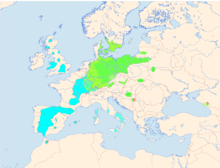Red kite
| Red Kite | |
|---|---|

| |
| Scientific classification | |
| Domain: | Eukaryota |
| Kingdom: | Animalia |
| Phylum: | Chordata |
| Class: | Aves |
| Order: | Accipitriformes |
| Family: | Accipitridae |
| Genus: | Milvus |
| Species: | M. milvus
|
| Binomial name | |
| Milvus milvus | |

| |
| Distribution map Cyan: resident; Green: breeding visitor | |
| Synonyms | |
|
Falco milvus Linnaeus, 1758 | |


The red kite (Milvus milvus) is a medium-large bird of prey in the family Accipitridae. This family also has other raptors such as eagles, buzzards, and harriers.
The species is found all over Europe and northwest Africa.[2] It is resident in the milder parts of its range in western Europe and northwest Africa, but birds from northeastern and central Europe winter further south and west, reaching south to Turkey.[2]
Red kites eat small mammals and carrion. They were wiped out in most of Britain, except for a few in south Wales. Farmers killed them, and so did the DDT picked up from their prey. They have made a big come-back in England and Scotland after they were recently re-introduced.[3][4]
A sighting of the first red kite in London for 150 years was reported in The Independent newspaper in January 2006.[5] In June 2006, the UK-based Northern Kites Project reported that kites had bred in the Derwent Valley, Tyne and Wear for the first time since the re-introduction.[6]
References[change | change source]
- ↑ BirdLife International (2013). "Milvus milvus". IUCN Red List of Threatened Species. Version 2013.2. International Union for Conservation of Nature. Retrieved 26 November 2013.
- ↑ 2.0 2.1 Snow D.W. & Perrins C.M. 1998. The birds of the western Palearctic. Oxford University Press. ISBN 0-19-854099-X
- ↑ Rod Liddle, BBC Radio 4. The kestrel and the red kite
- ↑ "The red kite in west Wales". Archived from the original on 2011-08-31. Retrieved 2015-07-05.
- ↑ McCarthy, Michael (13 January 2006). "Shakespeare's red kite returns to London after an absence of 150 years". The Independent on Sunday. [1] Archived 2012-11-03 at the Wayback Machine
- ↑ Delight as red kite chicks hatch. BBC News

